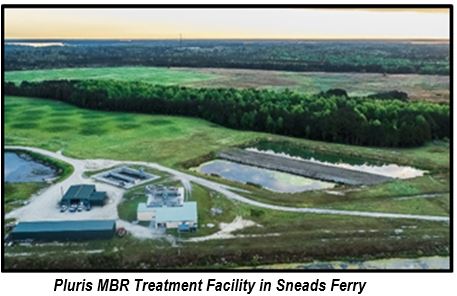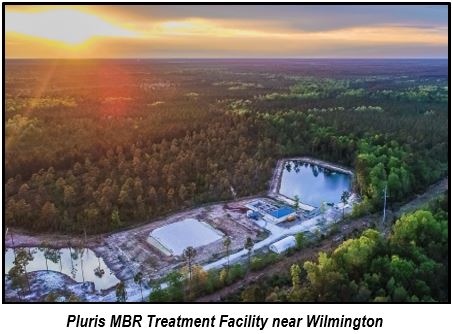Pluris Managing Member and Principal Engineer, Maurice Gallarda, PE along with Pluris’s consulting engineer Michael Gallant, PE presented a paper at as part of the International Water Pollution Symposium scheduled for May, in Valencia, Spain. Due to Covid-19, the symposium was conducted online between participants. The Paper entitled, “Membrane Bioreactor Wastewater Treatment Strategies for Sensitive Coastal Environments”, summarizes Pluris’s advanced membrane bio-reactor (“MBR”) wastewater treatment facilities along the environmentally sensitive coastal areas in North Carolina. The paper is published by the Wessex Institute and distributed throughout the European Union.
The presentation featured two of Pluris’s existing MBR facilities in North Carolina. Pluris’s third MBR facility was completed and brought online just after the presentation.

The two existing MBR facilities are shown in the photographs. North Carolina coastline consists of intercoastal waterways separating the mainland from the Barrier Islands. These waterways are environmentally sensitive areas where endangered species such as Sea Turtles and the Bald Eagle, which is a protected species, coexist along with humans. Significant population growth has been occurring in the area and along with the growth comes the challenge of treating increasing amounts of wastewater.

Pluris’s Membrane Bio-reactor wastewater treatment plants treat wastewater to near drinking water quality, representing one of the highest level of protection to the environment and public health. Two of Pluris’s MBR facilities have been operational dating back to 2012, since the first one was brought online near the intercoastal water ways near North Topsail Beach, a barrier island. The second MBR facility is situated near Wilmington and is near the waterways separating the mainland from Topsail Beach, another barrier island. The third MBR facility is located in Onslow County near Jacksonville. This facility began operating in July 2020, just after Journal publication.
The North Carolina Department of Environmental Quality which is charged with protecting the environment and the North Carolina Utilities Commission which is charged with protecting rate payers have both expressed support of Pluris’s facilities as models of balancing environmental protection and public health with the costs borne by rate payers of North Carolina.
For more information regarding Pluris’s membrane bio-reactor wastewater treatment facilities or a copy of the presentation paper, readers are encouraged to contact Maurice Gallarda at [email protected] or Michael Gallant at [email protected].

